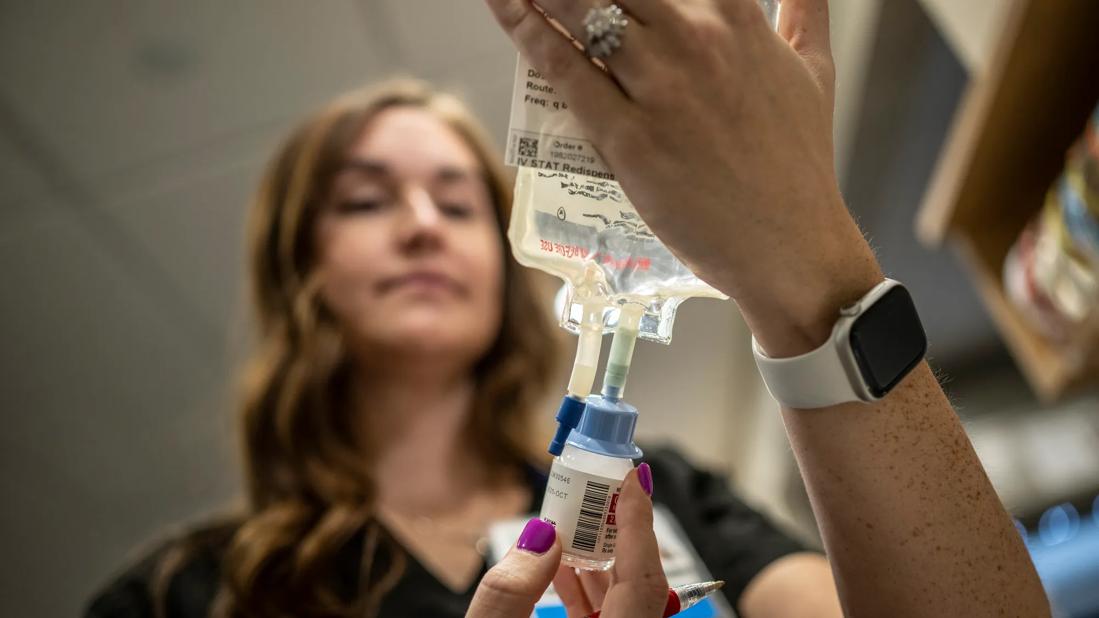Treatment may allow patients more time with less toxicity

A 45-year-old patient with stage IIIC high-grade serous ovarian cancer underwent a hysterectomy, bilateral salpingo-oophorectomy, omentectomy and debulking before receiving adjuvant chemotherapy with six cycles of intravenous cisplatin and cyclophosphamide. A second-look surgery revealed microscopic residual disease. She was treated with four cycles of intraperitoneal cisplatin followed by etoposide.
Advertisement
Cleveland Clinic is a non-profit academic medical center. Advertising on our site helps support our mission. We do not endorse non-Cleveland Clinic products or services. Policy
After an extended disease-free interval, biopsy revealed disease recurrence in the liver and spleen, for which she received two years of oral etoposide. Further evidence of progression was noted nearly 16 years from the original diagnosis. The patient was started on pegylated liposomal doxorubicin (PLD) 40mg/m2. The PLD was well tolerated, and the patient remained on it for more than 100 cycles, resulting in a cumulative dose of 4600mg/m2. More than 25 years from the original diagnosis, the patient’s Eastern Cooperative Oncology Group performance status remained one. Her disease was stable for nine years.
Patients with recurrent epithelial ovarian cancer, especially when their tumors become resistant to platinum chemotherapy, have limited treatment options and their disease is rarely curable, according to Robert DeBernardo, MD, Laura J. Fogarty Endowed Chair in Women’s Health for Uterine Cancer Research and Director of the Peritoneal Surface Malignancy Program with Cleveland Clinic’s Ob/Gyn & Women’s Health Institute.
“At this point in their treatment course, we tend to look for chemotherapy drugs with clinical benefit, acceptable toxicity and durable response,” Dr. DeBernardo says. “In our practice, we noticed that a subset of patients taking PLD responded well and were able to stay on it for many months or years.”
With this insight, Dr. DeBernardo and his team sought to assess oncologic outcomes and toxicity in patients with recurrent ovarian cancer treated with PLD (N = 69) who had more than seven cycles of PLD. “This retrospective study was the next logical step,” Dr. DeBernardo explains.
Advertisement
“Among this cohort of women with recurrent ovarian cancer who had clinical benefit after six cycles of PLD, we found that, continued use is both well-tolerated and effective,” says Laura Chambers, DO. “Nearly 60% of patients saw clinical benefit from extended PLD treatment, and about 32% of patients developed toxicities, most of them dermatologic.”
Native doxorubicin was approved by the U.S. Food and Drug Administration in 1964 and is used widely in oncology. Although it has been used for years, the drug has a significant and potentially life-threatening toxicity profile. In PLD, the liposomal encapsulation reduces the incidence of acute and chronic toxicities, including myelosuppression, dermatitis, stomatitis and cardiotoxicity.
“While doxorubicin is associated with dose-dependent cardiotoxicity, the liposomal encapsulation makes the treatment less toxic to the heart. Our data supports that the risk of cardiac complications is low with extended use of PLD. While this data is derived from a relatively small cohort patients, we believe that these results support that women with recurrent ovarian cancer who have experienced a response to PLD may safely stay on it indefinitely, with acceptable toxicity,” Dr. Chambers says.
Despite the overall lower toxicity profile, cases of oral squamous cell carcinoma (SCC) have been reported in women receiving long-term PLD. “In this cohort, we identified four patients who were diagnosed with early-stage oral cancers (a rate of 5.8%), and one of these women was a smoker. As a result, we recommend conducting an oropharyngeal exam as part of routine chemotherapy evaluations to ensure that there are no lesions that need to be evaluated or biopsied. Overall, our results indicate that if a patient is responding to PLD therapy, and is tolerating it well, we can keep them on PLD indefinitely – until their cancer progresses,” says Dr. DeBernardo.
Advertisement
Advertisement

Combining advanced imaging with targeted therapy in prostate cancer and neuroendocrine tumors

Early results show strong clinical benefit rates

The shifting role of cell therapy and steroids in the relapsed/refractory setting

Radiation therapy helped shrink hand nodules and improve functionality

Standard of care is linked to better outcomes, but disease recurrence and other risk factors often drive alternative approaches

Phase 1 study demonstrates immune response in three quarters of patients with triple-negative breast cancer

Multidisciplinary teams bring pathological and clinical expertise

Genetic variants exist irrespective of family history or other contributing factors